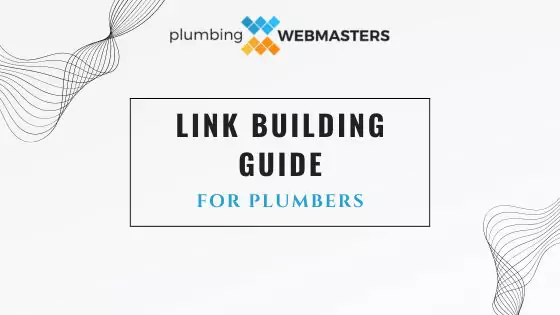What is Link Building for Plumbers?
Link building for plumbers is the process of acquiring inbound links from external domains to your plumbing business website.
Local sponsorships, email outreach, and content promotion are common techniques plumbing companies use to secure new link opportunities.

Why is Link Building Important for Plumbers?
Link building is significant because it helps increase your site’s visibility, establishes you as an authority, and significantly improves plumbing SEO.
In fact, external links are among the top two criteria used in Google’s indexing algorithm.
Google uses the amount and the quality of your backlinks to help determine whether to index your page.
A strong backlink profile can differentiate between gaining new customers for your plumbing business and losing out to the competition.
Remember, it’s all about increasing visibility and brand awareness.
But you have to do it right.
First, you need to know how to find backlink opportunities.
Second, you have to be able to discern between high-quality and low-quality links.
Link Building Strategies for Plumbers
There are various ways to go about link building, some more effective (and safe) than others.
Remember that black-hat link-building techniques can result in a manual penalty, removing your entire website from Google’s index.
It’s best to focus on white-hat link-building strategies for your business website to avoid this worst-case scenario.
Below are the most effective ways to get more links for your plumbing website.

Claim Directory / Social Media Listings
The easiest way to get more backlinks is to build free citations from local business directories.
Popular online directories like Google Business Profile allow plumbers to link from their profile to the company website, creating a nofollow backlink
Social media is the second most accessible source for external links.
Ensure your business is listed on Facebook, Instagram, YouTube, and even TikTok, and post content regularly.
Create Linkable Assets
Creating a unique and original content asset can organically drive new links to your website.
Generally speaking, blog posts harm plumbing websites because they typically regurgitate information already readily available on the web.
However, a location-specific, data-driven post like “The Average Cost of Water Bills in Fort Worth, TX,” is something that credible websites would link to.
The essential component of a linkable asset is expertise.
If you can provide insights distinguishable from “bloggers,” your post will naturally acquire more links.
Fix Broken Links
You may already have a few external links that have become altered by the hosting website and broken, resulting in that annoying “404 Error” message.
Another way to get more links is to fix the ones you already have.
You can check all the links in your backlink profile with free tools like deadlink checker.
Then, if you discover that your backlinks have been broken, you can contact the webmaster of the hosting page and let them know that it isn’t working.
No one wants any broken links on their website, so you would actually be doing other people a favor by letting them know about a broken link.
Industry Outreach
If you are a plumber, chances are you already know of authoritative organizations that could provide you with a high-quality backlink.
It’s just a matter of asking.
Think about the companies that supply you with your materials, tools, and replacement parts.
This strategy may be especially effective if you are an exclusive or certified seller of certain parts or appliances.
Reach out to organizations in the plumbing industry and ask them to include a link to your site on their websites.
If you work with local suppliers, you can offer a link exchange in which you feature a link for them on your site in exchange for a backlink to yours on their site.
Guest Blogging
Guest blogging can effectively increase your backlink profile if you are already a content-generating machine or have someone on your staff who handles outreach.
Reach out to other bloggers in the home service industry.
There aren’t many high-profile plumbing-specific blogs online, so it’s best to keep it general and stick to the home service, home improvement, general contracting, renovation, or construction niches.
Offer a guest blog on their site in exchange for your backlink.
This is not only a great way to build up your backlink profile, but it will also increase your authority in the industry and online.
Competitor Backlink Analysis / Comparison
You can also find more backlink opportunities by seeing where your competition gets backlinks.
You can use link analysis tools like Majestic to see where your competition’s backlinks are coming from.
This will give you an idea of the types of backlink opportunities available for your plumbing business.
Pro Tip: Contact these sites and promote your best content assets to add value to their pages or posts.
Backlink Quality for Plumbing Websites
Link building is more about quality than quantity.
For example, the impact of one high-quality link is far greater than 100 low-quality links.
Several factors determine a link’s quality and impact on your ranking, but generally, a high-quality backlink comes from a trusted, credible, and relevant domain.
Viewership and established authority/reputation are significant factors as well.
For example, a backlink embedded in the Los Angeles Times website would be much higher quality than one included on your cousin’s blog (unless your cousin happens to be a celebrity).
However, other factors determine whether a backlink is a high-quality endorsement or not.
These include:
Relevance
The more closely the website linking back to your site is related to your field (plumbing), the higher the relevance.
And higher relevance equals higher backlink quality.
For example, as a plumber, having a backlink on a general contractor’s website would benefit your business more than having a backlink on a reptile enthusiast’s website.
Anchor Text
The clickable text that brings you to another page or website is called “anchor text.”
Google’s algorithm has always considered anchor text a ranking factor.
Anchor text also influences quality, meaning bad anchor text from a good domain will decrease the potential value of the backlink.
Ideally, the anchor text should describe what the viewer will see or experience if they click the link.
An example of good anchor text for a plumber would be “How to fix a leak” if the link leads the viewer to one of your pages about leak repair.
An example of poor anchor text (which more often than not produces a low-quality backlink) would be “click here”—as in “to learn more about fixing a link, click here,” with the words “click here” being the actual anchor text.

Link Positioning
Where your backlink appears on a host’s page is also vital to its quality.
Ideally, your link should appear in the content block, not the footer or the sidebar.
That’s because people spend more time reading the actual content block.
Also, it would be optimal if your link appeared early in the content block instead of near the end.
Not all web pages get read to the very bottom, so having your backlink placed early in the content will increase its click-through rate.
Types of Plumbing Backlinks
Google and other search engines distinguish link types by how they are placed.
For example, a link that anyone can build does not have the same influence as a link that can only be built by a website editor.
Similarly, an internal link creates a different dynamic than one coming from an external, 3rd party website.
Let’s examine the different plumbing link types below:
NoFollow Links
NoFollow links are those from directories, social media platforms, and any profile-based URL entry.
Since users can manually input URLs into these profiles, Google views them as less impactful.
While NoFollow links don’t influence ranking as much as other link types, they serve as a hint for search engines.
Research also suggests that local directory links can improve local SEO rankings on Google Search and Google Maps.
DoFollow Links
DoFollow links require editorial placement from a third party.
For example, a local contractor in a different industry might recommend your plumbing company on their own website.
Google values these types of links higher because they require a voluntary endorsement from the person placing the link.
Of course, many marketing gurus try to take advantage of this by practicing black-hat link-building designed to emulate the insertion of a natural DoFollow link.
The easiest way to earn white-hat DoFollow links is to create great content.
Internal Links
An internal link exists on your own website, linking one page to another.
Effective link building is about intelligent internal linking as well.
When your plumbing website is easily navigated, all pages are accessible, and you can find helpful ways to link to commercial pages on your website, Google will notice.
Comprehensive internal linking also enhances the user experience of your website.
Relevant blog posts should include internal links to your service pages.
For example, if you have a post about water heaters, you could include an internal link to your water heater installation/repair page.
Link Building Strategies to Avoid for Plumbing Companies
Because links are a controversial topic within digital marketing, everyone has a different opinion about which strategies are most appropriate.
One thing is certain: using the wrong link-building techniques can result in a manual penalty from Google.
While you may feel the urgency to listen to the latest YouTube influencer about link building, it is better to avoid the following strategies:
Buying Backlinks
Google’s guidelines strictly prohibit buying links for ranking purposes.
Their document states the following:
Spam policies for Google web search
- Buying or selling links for ranking purposes. This includes:
- Exchanging money for links, or posts that contain links
- Exchanging goods or services for links
- Sending someone a product in exchange for them writing about it and including a link
Link Disavow
As stated by multiple Google employees, Google’s link disavow tool is obsolete.
If a competitor sends spam links to your website to reduce your rankings, Google’s algorithms will simply ignore these links rather than levy a penalty on your website.
If you choose to disavow links or pay an agency to do so, you are more likely to lose rankings than gain them.
Private Blog Networks (PBNs)
One black-hat link building strategy widely utilized in the digital marketing industry is private blog networks, or PBNs.
PBNs are a portfolio of several websites and domains controlled by a single webmaster to distribute link equity to their “money site.”
While PBNs have proven to improve rankings in the short term, their long-term implications frequently result in a manual Google penalty and a complete deindexation of your website.
Final Thoughts on Link Building for Plumbers
Link building for plumbers is an important component of your digital marketing strategy.
However, it’s important to focus on white-hat link building strategies that increase your rankings safely and sustainably.
Examples of white hat link building techniques include industry outreach, content marketing, and brand promotion.
If the entire backlink process seems complex and overwhelming to your plumbing company, contact Plumbing Webmasters to learn about our link building services.
Our agency has worked with thousands of plumbers for over a decade on long-term link acquisition strategies.
Link building for plumbers doesn’t have to be stressful when you consult with experienced professionals.






